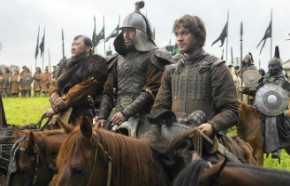Kublai’s clan

In December Netflix released an entire season of its original series Marco Polo, perhaps hoping to entice winter’s binge viewers. The show’s big budget reflects big aspirations: Netflix is reaching out to audiences outside the United States in an effort to expand its empire.
The show, loosely based in history, begins in the 13th century as young Marco Polo (Lorenzo Richelmy) arrives with his father (Pierfrancesco Favino) at the court of Kublai Khan (Benedict Wong). Kublai’s court is generally tolerant of people of other religions; in fact Kublai’s mother, Sorghaghtani Beki, was a Christian. While Kublai doesn’t share her faith, he respects it. His tolerance, however, is pushed to its limits when his son reads the engraving on a cross that Marco wears around his neck. “All kings shall bow before him” (Ps. 72:11).
Marco has grown up without his father. Now, soon after they’ve met for the first time, his father abandons him, buying himself safe passage on the Silk Road by offering his son to Kublai Khan as a gift. This is the beginning of the theme that the show treats best: daddy issues.




